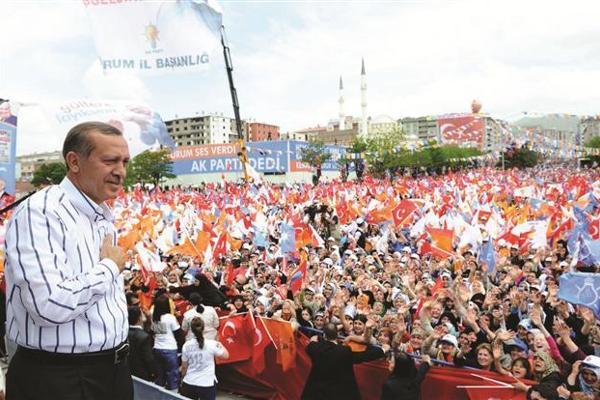Turkey’s election campaign is starting early
ANKARA - Hürriyet Daily News


Turkey will be going to the polls in local and presidential elections in 2014, and for parliamentary elections in 2015. AA photo
The ruling Justice and Development Party (AKP) government wants to move the local elections that were originally going to be held in March 2014 up to October 2013.The AKP says it is due to considerations for winter climatic conditions, but without a doubt concerns about the presidential election that is expected to take place in August 2014 lie behind the suggestion.
The AKP wants to put as much time as possible between the two elections, as they are aware that the result they get from the local elections is likely to affect the Çankaya elections directly. A constitutional change is needed to bring the date of the elections forward.
The main opposition Republican People’s Party (CHP) does not favor the local elections being moved to October 2013, but the AKP can make it happen with the support of the Nationalist Movement Party (MHP).
Regardless of whether the elections are moved up or not, the three elections that are set to take place consecutively have already put the country in an “election atmosphere.” Turkey will be going to the polls in local and presidential elections in 2014, and for parliamentary elections in 2015.
Parliament will start working again on Oct. 1. However, the AKP is rushing for Parliament to approve of a number of important regulations, including moving the local elections up.
They would therefore like to reopen Parliament in mid-September, instead of the beginning of October. The AKP seeks to put their signature on a very important regulation including the local administration reform as well as their effort to move the local elections up. Their target is to win important CHP municipalities such as İzmir, Antalya and the Çankaya district of Ankara.
They also aim to protect the existing AKP municipalities and keep their votes over 50 percent.
As Parliament opens, the AKP will pass the regulation regarding the founding of 13 new metropolitan municipalities.
Aydın, Denizli, Muğla, Tekirdağ, Trabzon, Şanlıurfa, Kahramanmaraş, Balıkesir, Van, Manisa, Hatay, Malatya and Mardin will be turned into “metropolitan municipalities.” The number of metropolitan municipalities will rise to 26. The opposition is also ambitious. CHP leader Kemal Kılıçdaroğlu has given signals he is a formidable adversary by saying that he will be opening a second election office in Istanbul.
The MHP is set to expose its project targets for the local elections after their congress.
The BDP aims to create a new “vision and display cabinet” in order to protect its regional municipalities and increase their numbers.
It seems like as the Parliament opens, Turkey will be entering a very early election atmosphere. The leaders and politics will be focusing on the upcoming elections and it will not be possible to get out of this atmosphere until the end of these three elections in 2015.
DEPUTIES’ PHONES, E-MAILS REPORTED TO BE ‘SAFE’
Every deputy in the Turkish Parliament suspects that his or her phone is being tapped. The chamber of the Parliamentary Constitutional Conciliation Commission was recently scanned for listening devices and found to be clean. Parliamentary Informatics Department and TÜBİTAK Informatics and Information Safety Center ran a joint operation after further claims of illegal eavesdropping in the Parliament were made. The communication networks of Turkish deputies were revealed to be safe. The phones and e-mail accounts of the deputies were not being monitored, according to the scan. “The safety levels of the phones used in the Parliament compound are of the highest standards. Our e-mail system is also being protected by the latest safety systems and is being constantly updated,” the Informatics Department said.
‘Nationalization’ offer from CHP
The CHP has a number of interesting suggestions for the new constitution. Under the “Fundamental Rights and Freedom” section, it wishes to add new regulations to include “focusing on national interests and the public good when privatizing and running strategically important sectors.” I asked senior CHP member Atilla Kart: “Is that a form of nationalization?” and he agreed it was. “It may lead to the nationalization of strategic firms like Telekom.” Another interesting offer relates to “land reform,” which was once identified with former CHP head Bülent Ecevit. The CHP suggests a new regulation foreseeing the state distribution of land to landless peasants.
